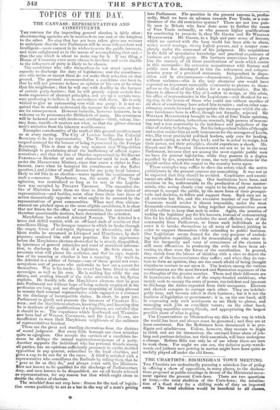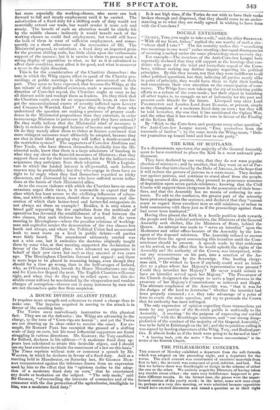THE CHARTISTS : BIRMINGHAM TOWN MEETING. THE Chartists are undoubtedly .
pursuing a mistaken line of policy in offering a show of opposition, in many places, to the declara- tions proposed at public meetings in favour of the ilinisterial move- ment against the present Corn-laws. There are two questions at issue,—the total abolition of the Corn-laws; the substitu- tion of a fixed duty for a shifting scale of duty on imported corn. The total abolition would be beneficial to all classes,
but more especially the working-classes, who never can look forward to full and steady employment until it be carried. The substitution of a fixed duty for a shifting scale of duty would not materially extend our trade, but would render it more safe and steady. The benefit of such an alteration would be chiefly felt by the middle classes : indirectly it would benefit such of the working• classes as could find employment, but would still leave the bulk of them in want of sufficient employment, and conse- quently on a short allowance of the necessaries of life. The Ministerial proposal, to substitute a fixed duty on imported grain for the present shifting scale, has little claim upon the enthusiastic support of the masses; but it is unwise in them to present such a strong display of opposition to what, so far as it is calculated to affect their condition, must affect it for good, and what is moreover a move in the right direction.
This is for the consideration of the Chartists themselves : the tone in which the Whig organs affect to speak of the Chartist pro- ceedings at public meetings is altogether unwarranted on their part. They seem to have expected, that because the Whigs, at the last minute of their political existence, made a movement in the direction of Corn-law repeal, the Chartists ought at once to lay all distrust aside and readopt them as leaders. Do they think that the Chartists could, even for an unquestionable boon, at once for- get the unconstitutional excess of severity inflicted upon LOVETT and Commis in Warwick Gaol ? Can they deny that those who understand the question are making a pretence of greater confi- dence in the Ministerial propositions than they entertain, in order to encourage Ministers to persevere in the path they have entered ? Do they really believe that the Ministerial triad of measures is likely to redress the deranged balance of income and expenditure ? Or do they merely allow them to tinker at finance convinced that more stringent measures must ultimately be adopted, because they see that in their blind groping they will inflict a death-wound on the restrictive system? The supporters of Corn-law Abolition and Free Trade, who have thrown themselves decidedly into the Mi- nisterial scale, know that there is a large admixture of humbug in what they say about the financial measures of Ministers ; that they support them mat for their intrinsic merits, but for the indirect con- sequences they anticipate from their adoption. With a Legisla- ture in which the landed interest is all-powerful, such indirect courses may be pardonable ; but they who engage in them have no right to be angry when they find themselves regarded as tricky characters, and distrusted by men who have suffered severe inflic- tions at the hands of their Ministerial allies.
As to the coarse violence with which the Chartists have on some occasions urged their views, is it reasonable to expect that the class which has least access to the civilizing influences of educa- tion, and which suffers most, should show a temperance and dis- cretion of which their better-bred and better-fed antagonists do not always set them an example ? Besides, it is only where a broad gulf separating the few capitalists from the multitude of operatives has favoured the establishment of a feud between the two classes, that such violence has been noted. At the town meeting in Birmingham—where the peculiar relations of working- man and capitalist render the demarcation of the two classes less harsh and abrupt, and where the Political Union had accustomed both to meet more on a level in public debate—all parties were fairly heard. The amendment ultimately carried was not a wise one, but it embodies the doctrine originally taught them by some who, at that meeting, supported the declaration in favour of the Ministerial plan ; who advanced no arguments in behalf of their new views but such as they sneered at two years ago. The Birmingham Chartists listened and argued : and there is more hope to be placed in reasoning beings, even though they should for a time go wrong, than in the half-savages of Ireland, who, as O'CONNELL bids, hurrah for Home Manufactures one day and for Corn-law Repeal the next. The English Chartists will come right, and when they do they may be relied upon : but this de- sirable event will not be accelerated by the vituperation and random charges of corruption—thrown out in many instances by men who are not themselves quite free from suspicion.



























 Previous page
Previous page